The problem with Carthage being that it belongs to the East. Santiago and Hippo both host great Saints, and James and Augustine both fit Spain. Cordoba or Fes could also work- Apostolic Throne of St. Basil...

Rome AARisen - a Byzantine AAR
- Thread starter General_BT
- Start date
-
We have updated our Community Code of Conduct. Please read through the new rules for the forum that are an integral part of Paradox Interactive’s User Agreement.
You are using an out of date browser. It may not display this or other websites correctly.
You should upgrade or use an alternative browser.
You should upgrade or use an alternative browser.
Carthage - that's Eastern Territory, although long overdue for a Patriarch-type priest.
Cordoba - close to the throne yes, better than Compostela, but not famously Christian, unlike the other one.
Valencia and Barcelona will not do unless there's a capital move towards the north.
Toledo, maybe?
Cordoba - close to the throne yes, better than Compostela, but not famously Christian, unlike the other one.
Valencia and Barcelona will not do unless there's a capital move towards the north.
Toledo, maybe?
Just because Carthage currently belongs to the east doesn't mean that it wouldn't be ideal for the Western Empire to use it in this fashion. They ARE long overdue for a patriarchate, and a civil war is the perfect opportunity for them to seize a forgotten border province from the Eastern Empire...
Exactly how forgoten would it be though? I don't know how much production had decreased my this time, but I think that after Egypt, Carthage was the largest grain producing area for the Roman Empire. Something that neither side in the civil war would want to lose during the current famine. Anyways I thought there already there already was a Patriarchate in Carthage, or was that plan not followed through?
As far as I know, the Bishop of Carthage was never elevated to Patriarchate. One of the Emperors wished to elevate, but the the other 4 wouldn't have any of it. While both Hippo and Compostela would work, I think they are too closely related to Roman Catholicism to have a Patriarch installed for Orthodoxy. The same can be said of Barcelona or even Valencia. The Greek's stronghold tends to be south of the Duera-Ebro line. Judging by Nik's character, he wants something all his own, something entirely Western Empire, that he can call his own. This is why it needs to be something relatively unknown so that Nik can pull a Peter the Great. Take a town that is relatively unimportant in the current scheme but still has a place in the realm (say Seville), incorporate the City into the Imperial demense so that it can be completely redesigned in the Greek Fashion. The old mosque torn down and a Basilica built over it, which is what happened IRL, an Imperial Summer Residence built, and all other accessories necessary for a truly Western Patriarchal Metropolis. For this, I can see Sevilla as being the City with the least amount of work, but the Province just north of Badajoz (Aracena?) or even Malaga or Mucia might work for this. Of course, this all depends upon where you wanna take it lol. Great Story irregardless BT.
Cheers,
~Hawk
Cheers,
~Hawk
Maybe Madrid? As far as I know, it was only built later. Now it's probably a smallish town.
Cordoba has a slim Orthodox majority, and since it is the imperial capital and already has a basilica, it would be the easiest to make into a Patriarchate. In addition, Seyfullah would have great control over it if it were located in his capital.
I thought Manuel had gotten his way on the Carthaginian Patriarchate? Ah well.
Ah well.
The 'Sword of God' seems destined to be quite a player in history, I guess your breeding program holds true even when out of your direct control. Martial 16! I wouldn't be surprised to see Tunisia and maybe even Sardinia and Sicily fall to the West should the East fragment.
The 'Sword of God' seems destined to be quite a player in history, I guess your breeding program holds true even when out of your direct control. Martial 16! I wouldn't be surprised to see Tunisia and maybe even Sardinia and Sicily fall to the West should the East fragment.
I wouldn't be surprised to see Tunisia and maybe even Sardinia and Sicily fall to the West should the East fragment.
The synergistic combination of timing, location, events and people is perfect for it.
Happy New Year!
Hey everyone--no update today (I'm recovering from New Years parties :rofl , but I did want to reply to everyone, and also show you a little tidbit to make upe for the lack of updates (update itself is about half done at the present time). The tidbit is another flag from the future--you all can have some fun guessing where it comes from, or what it is:
, but I did want to reply to everyone, and also show you a little tidbit to make upe for the lack of updates (update itself is about half done at the present time). The tidbit is another flag from the future--you all can have some fun guessing where it comes from, or what it is:
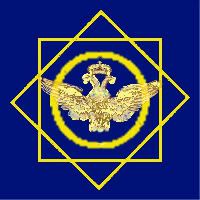
Clydwich – Nikephoros didn’t quite burst—exploded onto the stage might be a better choice of words. However, we’ve seen young emperors explode onto the stage before only to flame out (Thomas II?)…
Enewald – So long as Nikpehoros reigns long, and reigns just as he’s started, the West is in good shape for a long time.
English Patriot – I think that’s the big reason this AAR has gone on so long and all my other AAR attempts in other fora (okay, the one) flopped. CK is full of potential stories, side stories, tangents and fun, character wise!
asd21593 – I figured he’d be a crowd favorite!
Hawkeye1489 – You could argue that the East’s problem is that there are too many adept people—everyone wants to be the chief, and everyone’s got the ability to raise a pretty formidable army to stake their claim (see Bardas, Adrianos, or Theodoros). The West, there’s now just… well… Nikpehoros.
Sevilla could be a compromise candidate for Nikephoros—its close to Cordoba, but not as famously Muslim a city… a place he could really stamp in his own image. It could be a choice…
Hannibal X – It hasn’t gone Arab… a better description is it’s going Andalusi. Something new is forming in the West, a mix of native Christian and Muslim alongside new Eastern Orthodox and Greek imports. Now, this new mix probably views itself just as Roman as their eastern cousins, and at least the upper crust speaks Greek as well. Sefy is just that new mixing permeating to the top for the first time. And no, his brother is Alexandros, Greek through and through.
Something new is forming in the West, a mix of native Christian and Muslim alongside new Eastern Orthodox and Greek imports. Now, this new mix probably views itself just as Roman as their eastern cousins, and at least the upper crust speaks Greek as well. Sefy is just that new mixing permeating to the top for the first time. And no, his brother is Alexandros, Greek through and through.
As for the proposed Patriarchate being in Hippo, the big problem is that Hippo is far removed from Cordoba. Sefy wants a Patriarch he can…encourage…to bring more religious unity. A.k.a. stop the bishops in the north from saying bad things about the ‘heathen-like’ Emperor in Cordoba…
As for the Apostolic Throne of St. Basil—Basil isn’t an Apostle, so he doesn’t get an Apostolic throne. That and while he’s been glorified in the East, the Western Church still hasn’t recognized either him or Demetrios as saints. That’d be the problem with a Patriarchate in Mauretania—there wasn’t ever really a strong Christian presence there (at least, not on the scale of North Africa or Spain)…
TC Pilot – No one is singing and dancing on tables yet, be thankful.
FlyingDutchie – David’s descendants alone seem to be unaffected by the madness that seems to be running down the main imperial line. Incidentally, the descendants of Basil’s middle son Manuel are still ruling as Princes of Tangiers, and are mad hatters as well…
Vesimir – Sefy and Gabriel? Considering I know what I know about where they end up, there are many many many parties that would do absolutely anything to keep those two from being that close! :rofl:
Servius Magnus – In the CK game the story is based on, no, before this Spain was all the kingdoms I’d set up there because I was bored. In story, the Western Empire has just changed composition. Under Alexios, there was outer strength, and underneath it there was still the remains of the old Exarchate system floating about. Nikpehoros basically started shattering that. Baetica, Tarraco and Africa are the only Exarchates left, and Baetica’s Lord Thrakesios (son of the Thrakesios that was Basil’s nephew and original Exarch) has no heirs…
AlexanderPrimus – Yup, from Warlords! Santiago could be a good choice, save that would put the Patriarch in the far north, in the middle of the hostile bishops. It could be an aggressive play to make sure that the Patriarch’s authority is respected (he can go after people more easily), but it places him far from Cordoba, where the bishops would have easier access to his ear than the Emperor…
…ah yes. The call of the East to the West…
RGB – Likely before the century is out, Carthage will be receiving a patriarch or patriarch level priest. With the recreation of Mare Nostrum, Carthage has resumed its position as a major trading port and enormous city in its own right. And yes, politically Cordoba might make the most sense, but religiously it doesn’t work as well as the others. The critical point might be how hard Nikephoros is willing to stomp to get his way.
von Sachsen – By the Middle Ages grain production from North Africa had decreased quite a bit—mostly because of the northward advance of the Sahara. However, I think there was still a great deal more being produced there than, say, today. As for the Carthage Patriarchate, that was never followed through—Manuel got distracted invading Italy and harassing the Pope.
4th Dimension – Madrid would be if he really wanted to build a summer residence and turn a sleepy village into something enormous and completely of his own making…
VILenin – Nope! Invading papal lands and in general causing a mess in Italy isn’t the way to get religious backing for you to have a new Patriarch under your finger. If the East does go boom at this moment, Sefy is definitely one to take full advantage of the opportunity…
If the East does go boom at this moment, Sefy is definitely one to take full advantage of the opportunity…
Hey everyone--no update today (I'm recovering from New Years parties :rofl

Clydwich – Nikephoros didn’t quite burst—exploded onto the stage might be a better choice of words. However, we’ve seen young emperors explode onto the stage before only to flame out (Thomas II?)…
Enewald – So long as Nikpehoros reigns long, and reigns just as he’s started, the West is in good shape for a long time.
English Patriot – I think that’s the big reason this AAR has gone on so long and all my other AAR attempts in other fora (okay, the one) flopped. CK is full of potential stories, side stories, tangents and fun, character wise!
asd21593 – I figured he’d be a crowd favorite!
Hawkeye1489 – You could argue that the East’s problem is that there are too many adept people—everyone wants to be the chief, and everyone’s got the ability to raise a pretty formidable army to stake their claim (see Bardas, Adrianos, or Theodoros). The West, there’s now just… well… Nikpehoros.
Sevilla could be a compromise candidate for Nikephoros—its close to Cordoba, but not as famously Muslim a city… a place he could really stamp in his own image. It could be a choice…
Hannibal X – It hasn’t gone Arab… a better description is it’s going Andalusi.
As for the proposed Patriarchate being in Hippo, the big problem is that Hippo is far removed from Cordoba. Sefy wants a Patriarch he can…encourage…to bring more religious unity. A.k.a. stop the bishops in the north from saying bad things about the ‘heathen-like’ Emperor in Cordoba…
As for the Apostolic Throne of St. Basil—Basil isn’t an Apostle, so he doesn’t get an Apostolic throne. That and while he’s been glorified in the East, the Western Church still hasn’t recognized either him or Demetrios as saints. That’d be the problem with a Patriarchate in Mauretania—there wasn’t ever really a strong Christian presence there (at least, not on the scale of North Africa or Spain)…
TC Pilot – No one is singing and dancing on tables yet, be thankful.
FlyingDutchie – David’s descendants alone seem to be unaffected by the madness that seems to be running down the main imperial line. Incidentally, the descendants of Basil’s middle son Manuel are still ruling as Princes of Tangiers, and are mad hatters as well…
Vesimir – Sefy and Gabriel? Considering I know what I know about where they end up, there are many many many parties that would do absolutely anything to keep those two from being that close! :rofl:
Servius Magnus – In the CK game the story is based on, no, before this Spain was all the kingdoms I’d set up there because I was bored. In story, the Western Empire has just changed composition. Under Alexios, there was outer strength, and underneath it there was still the remains of the old Exarchate system floating about. Nikpehoros basically started shattering that. Baetica, Tarraco and Africa are the only Exarchates left, and Baetica’s Lord Thrakesios (son of the Thrakesios that was Basil’s nephew and original Exarch) has no heirs…
AlexanderPrimus – Yup, from Warlords! Santiago could be a good choice, save that would put the Patriarch in the far north, in the middle of the hostile bishops. It could be an aggressive play to make sure that the Patriarch’s authority is respected (he can go after people more easily), but it places him far from Cordoba, where the bishops would have easier access to his ear than the Emperor…
…ah yes. The call of the East to the West…
RGB – Likely before the century is out, Carthage will be receiving a patriarch or patriarch level priest. With the recreation of Mare Nostrum, Carthage has resumed its position as a major trading port and enormous city in its own right. And yes, politically Cordoba might make the most sense, but religiously it doesn’t work as well as the others. The critical point might be how hard Nikephoros is willing to stomp to get his way.
von Sachsen – By the Middle Ages grain production from North Africa had decreased quite a bit—mostly because of the northward advance of the Sahara. However, I think there was still a great deal more being produced there than, say, today. As for the Carthage Patriarchate, that was never followed through—Manuel got distracted invading Italy and harassing the Pope.
4th Dimension – Madrid would be if he really wanted to build a summer residence and turn a sleepy village into something enormous and completely of his own making…
VILenin – Nope! Invading papal lands and in general causing a mess in Italy isn’t the way to get religious backing for you to have a new Patriarch under your finger.
It's not about what the countries want. It's about what they want.
And that is the flag of some part of the Western empire. And the yellow circle looks a little too pixelated.
And that is the flag of some part of the Western empire. And the yellow circle looks a little too pixelated.
Is that a EU3 flag?
You could increase to contrast and reduce noise, but that two-headed eagle always gives people problems.
You could increase to contrast and reduce noise, but that two-headed eagle always gives people problems.
For the patriarchate, the Balearics, Toledo or Sevilla. Or Jibr al Tariq.
And the flag is Aionite Egypt. The symbol can be seen in Mosques, the ingame flag for Christian Egypt is Blue and Gold, and the Circle could be Aionite with the Eagle being Roman.
And the flag is Aionite Egypt. The symbol can be seen in Mosques, the ingame flag for Christian Egypt is Blue and Gold, and the Circle could be Aionite with the Eagle being Roman.
And the flag is Aionite Egypt. The symbol can be seen in Mosques, the ingame flag for Christian Egypt is Blue and Gold, and the Circle could be Aionite with the Eagle being Roman.
This. Will you somehow put Aionism in the EU3 savegame?
Also, put the patriarchate in Cordoba.

”What is the point of a war that can be won through the death of one man? Assassination isn’t barbaric—letting loose the dogs of war in the name of a personal grudge is.” – attributed to Albrecht von Franken
March 13th, 1239
Antioch
Albrecht von Franken sighed, looking at the icon yet again.
It was very ornate, a gift from one of the Metrotrepokoi that now flooded Syria. Apparently some of the newly converted had heard of words that Thomas II had said the night of his grevious injury—some nonsense about a Saint Muhammad. To these new converts to Christianity from Islam, such words seemed to indicate a man who knew how to bridge the religious divide—a man that needed an icon for veneration.
“Utter foolishness,” was all Albrecht could grumble. He had no idea if Thomas had said something about Muhammad or anything else for that matter, but from what Albrecht knew, his friend would’ve been in incredible pain and delirium. Someone could say anything in those situations, and that didn’t necessarily make it divinely inspired. With another glance, he decided it looked nothing like his late best friend; the hair was rather close cropped, where Thomas’ had been wild, the face sturdy and solid, where Thomas’ had always been filled with some excitement from the madness. Even the gold overlay on his lamellar armor and shining spear seemed wrong—it made Thomas seem too brilliant, too... otherworldly. Albrecht smiled slightly—the spartan Thomas Komnenos he knew would have thrown a fit.
The Megoskyriomachos sighed, looking at those brown eyes again. They stared dispassionately back at him, as if they were quietly peering into his soul, whispering:
Murderer.
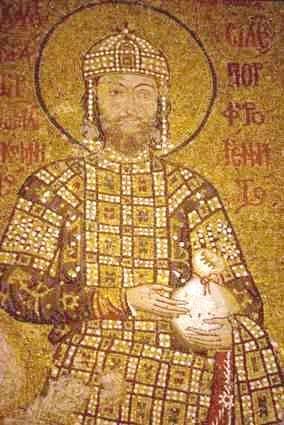
Amongst the Metrotrepokoi—the new converts to Christianity from Islam—the apocryphal utterings of Thomas II in his last days took on great meaning. While some began to make icons and regard him as glorified, the Church would not, and to this day has not, recognized him as a glorified saint.
Albrecht slammed the icon face down on the desk. He wasn’t a murderer. He hadn’t ordered Eleutherios to kill Thomas, Bardas did. He knew that—Eleutherios had told him of that!
But you knew about it, didn’t you? his conscience snarled yet again. And you could have told Eleutherios to not go through with it. You could have stopped it. But you didn’t…
Yes, he’d known. It hadn’t been supposed to follow that path. Thomas was supposed ot take Mecca, while Eleutherios allowed Albrecht to keep a close tab on Bardas and all his doings. When Thomas eventually died, Eleutherios was supposed to arrange for Bardas to act, compelling Gabriel to come to Albrecht and setting up Albrecht’s rise to power after his friend’s death…
…it’d all gone to hell, the moment Bardas ordered Eleutherios to kill Thomas. Albrecht closed his eyes, sighing, hoping the demons that reminded him of his sin would leave. There was nothing he could’ve done to save Thomas, he told himself. Nothing. Albrecht tried to tell himself that Eleutherios’ death was such a bad thing because it would’ve let Bardas continue to molest the security of the state, without someone to report his plans and actions to Albrecht. But he knew that wasn’t true… no, it wasn’t true…
But that’s not the reason you told Eleutherios to go ahead, his own conscience damned him. It would have meant the end to Eleutherios as your double-agent…
No, it would’ve meant his death, Albrecht told himself, anger rising in his mind. He couldn’t allow that! He couldn’t fathom that! He’d only just found out about Eleutherios’ true ancestry, that his indiscretion years ago had borne fruit! If he’d ordered him to not assassinate Thomas, Bardas would’ve known Eleutherios was working for more than one master! He would’ve had him killed!
And then I would’ve been guilty of having a part in the murder of my own bastard son, not my best friend! Albrecht hissed to himself. The thought provided entirely too little comfort—the icon might have been laying face down on the desk, but Albrecht could still see those brown in brown orbs, staring calmly at him…
He needed to keep himself busy! That’s what he needed! Von Franken hurriedly began shuffling the papers on his desk with all too much eagerness, looking for some problem to wrap his mind around, something to keep his conscience occupied—and quiet. Most were letters, matters of state or appointments that were far too mundane. He stopped momentarily on the agreement signed between Emperors Gabriel and Thomas and the representative of Nikephoros in the West, promising a Patriarchate in return for the Western Emperor threatening to bring troops to Italy. Albrecht knew the soldiers wouldn’t be needed—not if everything went according to plan—but Emperor Nikephoros could persuade Bardas’ son Michael to come to heel, rather than forcing Konstantinopolis to wage an expensive war retaking Italy yet again.

Michael Komnenos of Calabria, son of Bardas
Yet the agreement was already signed, with the seals of both Thomas and Gabriel red and gleaming at the bottom. The voices of his conscience began to whisper again, and yet again, Albrecht began hurriedly flipping through the papers. A letter to the Prince of Epirus, demanding he rescind his oath to Antemios. A note from Georgios Donauri, saying that he would likely need additional men to handle the upcoming hajj in Arabia. A complaint from Despotes Theodoros that…
Ah, yes, the Despotes problem. Something major, something complicated, something guaranteed to keep Albrecht’s conscience quiet while his mind wrapped itself around the problem.
Chiefly, the title itself. Since it was handed to Bardas for his actions securing Italy for the Komnenoi during Andreas’ coup, it had only been handed to two other lords—Adrianos of Edessa, and Theodoros of Damietta. All three had used the title to become, in effect, super-dynatoi, bribing, cajoling, or browbeating the princes of neighboring themes into listening to their word, carving up miniature ‘empires’ within Romanion itself. Albrecht had not foreseen the title becoming so powerful so quickly—Bardas, for example, had used it to browbeat the length and breadth of the Italian peninsula to his will.
And Bardas was not the end of the matter. Even after Bardas was defeated, Albrecht saw it was only a matter of time before trouble brewed anew. Adrianos was the next likely culprit—he’d already used his extensive influence to have his son placed on a created throne in Baghdad. It was only a small step for him to try to do the same with the Throne of Caesars.
So how to solve the problem of Adrianos and Theodoros having too much power in their title of Despotes? Stripping them of the title was out of the question—Adrianos and Theodoros’ brother Nikolaios had used the positions while Thomas and Albrecht were occupied with the Persian wars to consolidate their position. They were nigh immovable, not without the use of force—something Albrecht was loathe to do in the aftermath of a civil war. The Empire needed peace, time to absorb her conquests, not more war, more strife, and the most powerful lords of the realm aligned against the crown,
So what to do… what to do…
==========*==========
Antalya
Bardas Komnenos, Despotes of All Italy and Kaisar of the Roman Empire, uneasily shifted on his rude wooden campstool as another cramp went through his stomach. Normally, Bardas would’ve glared angrily at his cook, and at the manservant that had spiced his beef stew that night, but he was too focused on calming his stomach. He was sure there was no poison—the two men were utterly loyal, just incompetent. Bardas had told that Bulgar Aspar that too much pepper riled his stomach, but Aspar had apparently forgotten. Again.
As if his stomach wasn’t enough of a problem. The Kaisar also had all the parchments scattered about his desk—quartermaster’s reports, company tallies, orderly reports, the detritus of a massive army that seemed intent on devouring a forest of paper in mundane reports. A fresh batch of thematakoi from Bosnia had arrived, javlineers and Slavs, mostly. They were more mouths to feed, but they raised his army here at Antalya alone to nearly 75,000 in the massive winter camp, only part of the 130,000 total in this and the other two field armies, as well as garrisons for western Anatolia.
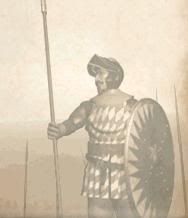
Bardas’ infantry was mostly Italian militia, well outfitted with metal helms, stout spears, chain armor and large shields.
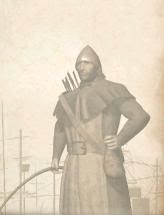
Archers were a weak point in Bardas’ army—the Italians nor the Normans had a tradition of using the bow as a respectable part of combat. Genoese, Venetian and Pisan sailors were actually a bulk of Bardas’ archery corps.
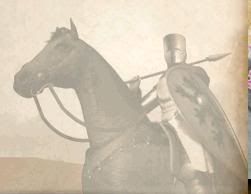
Italy did not have a long tradition of mounted warfare either, but from the Balkans and northern Italy Bardas has managed to cobble a respectable, if not formidable, mounted arm, the Balkans units outfitted in the Roman tradition, the Italian units more akin to Norman knights.
And then there were the other papers—complaints from Thessalonike and Konstantinopolis that the grain crisis was only growing worse. Mobs in Thessalonike had broken into the city’s granaries, carting off thousands of pounds of food meant for the garrison. In Konstantinopolis, the news was even darker—disease had raised its ugly head, and even the garrison granaries were low. The Prefect reported that the Nubiatakoi had to be dispatched to the Market Quarter to stop a mob that had started breaking into buildings looking for food. Hundreds were hacked apart in the streets, and fifteen funeral pyres had already been set up.
Riots and mobs were a constant part of life in Konstantinopolis—the mob could scarcely be avoided in a city that massive—but what disturbed Bardas the most was that the death toll. While the Kaisar fully believed that any who stood in the way of law and order should be punished, the high number of dead implied a dangerous thing—the mobs weren’t dispersing when the army arrived, as normal. The people were getting desperate, and if too many people were desperate enough, no amount of guardsmen would be able to hold them down.
Bardas’ stomach growled again as he finished another report. Evidently Antemios had noticed this as well—both the Emperor and his family had vacated the Great Palace for the relative safety of Chrysopolis, across the Marmara. While Bardas winced at the idea, he couldn’t fault his stooge. The mobs were hungry and angry, and if he had remained, it would’ve only been a matter of time before they attacked the Imperial person.
All the more reason to end the war quickly and decisively. Bardas had grain reserves, but they were allotted to the army—enough for a three year campaign. The Kaisar shifted yet again on his chair. If he could crush Gabriel quickly, he could ship the remaining grain back to The City, easing the situation and hopefully allowing the Emperor to return. If not, Antemios’ very act of leaving the city left them dangerously exposed politically…
“Excuse me, Highness.”
Bardas looked up, and finally let himself glare at the stupid Aspar. The Bulgar winced at the absolutely deadly look. By interrupting, he was keeping Bardas from finishing the paperwork. And by delaying the paperwork, he was delaying when Bardas could make the twenty minute hike to the latrine lines at the edge of the camp, and relieve himself of his misery.
“There is a man outside, says his name is Leo Diogenes, and that he represents Emperor Nikephoros in the West.”
Bardas made a noise halfway between a growl and a sigh.
“Send him in, tell him to be quick,” he hissed.
==========*==========
Antioch
…What to do…
Albrecht focused his mind. Taking the title away was impossible. Maybe the best route would be to tame it…
…tame it. How to tame it? He parsed down the chief problems with the title—it was exceptional, it granted its holder far more authority than a normal thematic prince, which allowed people like Adrianos and Theodoros to build up mini-empires…
…the exceptionalness. That was the core problem! If Despotes was a more common title, a title integrated into the bureaucracy, with clearly delineated responsibilities, the beast could be brought to heel! And the best way to stop it from being exceptional is to make it unexceptional! Make more Despotes…
Divide the whole Empire—that was it—into officially delineated Despotates, each carefully sized to counterbalance its neighbors! It would break up the cabals led by Adrianos and Theodoros—the princes following them would be quick to abandon their cause if the state dangled a ‘promotion.’—and taking control of the title Despotes would allow the Imperial government to effectively gain control over who received the title, and who didn’t. The themes might now be hereditary, but the Despotes could still be centrally appointed from among the princes, restoring some measure of central authority.
The move would also serve a practical purpose, Albrecht told himself. The Empire, simply, had too many themes to be effectively watched and controlled from Konstantinopolis—the preceding fifty years had clearly shown that fact. By adding an intermediate layer of bureaucracy, “super-princes” if you will, Albrecht would be forced to watch fewer men for raising trouble. No Despotes would broach trouble from his underlings, and watching ten or fifteen men would be easier than watching nearly one hundred…
The Megoskyriomachos looked about, rifling through the parchments until he came across a clean piece of paper. Quickly, haphazardly, he began to sketch, and think, and plan…
==========*==========
Antalya
“Greetings, Your Highness,” Leo Diogenes bowed as he entered Bardas’ ornate tent.
The Kaisar grunted in response. His stomach had given up its protests momentarily—but Bardas knew that only meant in a few minutes it’d launch back into its angry tirades with renewed vigor. He prayed the meeting, officially planned and scheduled, would be short. By the extremely rich foreign dress, lilting aristocratic accent and airy demeanor of this Leo, Bardas didn’t have very high hopes.
“So what is it?” he half-growled motioned for Leo to take a seat on the camp stool opposite.
“I understand Your Highness is in a hurry,” Leo said pleasantly enough, “so, I shall be brief.”
Bardas blinked, and secretly thanked God above.
“My master rules a country filled with many different peoples, and a few bishops in the north are stirring up trouble. He wants to know, if Your Highness, as well as Emperor Antemios, would be willing to lend your voices to support a new Patriarchate for Spain, to curb these excesses by malcontents among the clergy.”
“A Patriarch?” Bardas furrowed his brow. The Church itself had already raised the issue of a Western Patriarchate three times—once during the reign of Manuel Komnenos, once privately during the reign of Thomas I, and then again in 1215 once it became apparent the Western Empire was, in the short term at least, going to be a stable political unit. Yes, the Papacy in Hamburg would drag its feet and try to obstruct as best it could, but if Nikephoros was ready to simply wait, in a decade or two the Church would act on its own, without the consent of the See of Saint Peter if necessary. It’d happened before, with the now defunct Bulgarian Patriarchate.
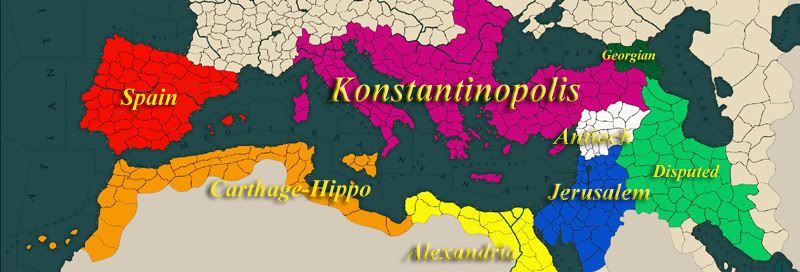
Changes had long been considered to the Patriarchal system. Any new Patriarchates, however, would likely not be considered apostolic—they could not trace the ‘lineage’ of their pontiffs back to an apostle of Christ. The latest proposal involves a Patriarch to be created for Africa, based in either Carthage of Hippo, that would have dominion over bishoprics into Mauretania. Another Patriarchate, location still to be determined, would govern the churches of Spain. An unresolved yet contentious issue is the future of Mesopotamia and Persia. Neither have enough bishops to yet really deserve a Patriarchate of their own, but neither are their links to existing Patriarchs clearly delineated. Both Antioch and Jerusalem claim overlordship of the regions, and both often issue countermanding orders to the bishops present.
“What would you be willing to offer us in return for raising such an important issue?” Bardas crossed his arms. While his stomach was in pain, he was still perfectly capable of playing the necessary roles of state. “It would be extremely difficult, I imagine,” the Despotes lied, “Antioch is in the hands of people who are against me, as is Alexandria. Jerusalem is already a weak member of the Pentarchy, and would likely not want to see another Patriarch added, and…”
“Even if they’re merely autocephalous?” Leo interrupted, face looking crestfallen.
Bardas gave a scoffing laugh. “Ha! Only an idiot wouldn’t see that even a weak, autocephalous Patriarch of Spain would have more authority and command more respect than Antioch or Jerusalem!” Bardas drove the lie even deeper. “By God, they’d hold as many bishops and souls under their thumb as Alexandria or Hamburg, and could reasonably poke Konstantinopolis in the side! No, my friend…”
“What if we offered an army?” Leo interrupted again, crossing his arms in reply.
“…an army?” Bardas echoed quietly.
“We understand that Sicily and Africa are still loyal to Gabriel’s cause,” Leo smiled slightly, “and that they are giving your son Michael serious trouble.”
Bardas gave a thin smile in reply. So Michael’s failures were even known in the west?
To be fair, Michael Komnenos of Apulia had been handed a difficult role in his father’s plan. While the elder Bardas proceeded to take the majority of the Italian thematakoi to Konstantinopolis and thence Anatolia, Michael was charged with raising additional thematakoi from the princes and peoples of Italy and taking Imperial Sicily and Carthage. In the former, Michael had been only partly successful. Prince Nikolaios Komnenos, brother of the late Thomas II, had been an easy mark—all his life, the man had wanted nothing more than to not be involved in politics, and the merest mention of the word made him offer whatever was required to get political suitors to go away. However, the great cities of the north—Genoa, Florence, and Venice—had all been loathe to commit themselves—Bardas’ own campaign during the last civil war had convinced them that active involvement could be dangerous.
This meant poor Michael was left with 20,000 men total of dubious quality to try to invade Imperial Sicily and Africa with 40,000 in various levies and city militias between them. Bardas doubted the Megas might have made headway in such a situation.
“My master would be willing to supply 40,000 men, and lead them in person, once his campaign into France has been successfully concluded,” Leo continued.
“He expects Arnaud to fold quickly?” Bardas muttered, his mind distracted by something other than his roiling stomach. Where was the catch? There had to be a catch somewhere! The caveat that the campaign would come once Nikephoros had driven Arnaud back seemed the only thing present—and that really wasn’t much of a catch, in Bardas’ eyes. He’d been obviously too busy to keep track of the Western Empire’s progress in depth, but he’d openly cackled when merchants came through Antalya with details of how Nikephoros had threatened the Duke of Toulouse. The boy had skill, that was sure, and Bardas also had no doubt the great feudal lords of France would quickly lose their desire for war if Nikephoros won a few more victories.
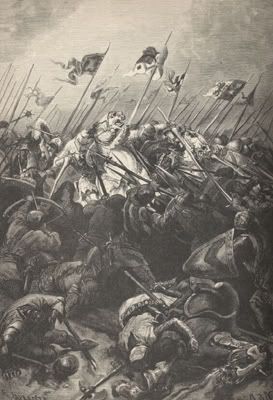
By the time Leo had his conversation with Bardas, Nikephoros had already mauled King Arnaud’s army outside Bordeaux. The French barons quailed at their King foolishly continuing the conflict—by August of 1239, France and the Western Empire were once again at peace, status quo ante bellum.
“My Lord began his campaign in March, God willing,” Leo replied with a smile brimming with confidence, “And I have no doubt that he’ll press King Arnaud out of Berri, and past Orleans if necessary.”
“Mmm,” Bardas grunted, folding his hands and looking down as if he was in thought. Why not? If all Nikephoros wanted was a Patriarch, why not say yes to ‘encourage’ the Church to do something it had been considering for some time? At worst, Nikephoros was lying, and Bardas lost little—God willing, when he moved with his vast host of 75,000 across Anatolia, he’d quickly crush Gabriel and unite the Empire once more…
“Tell your master I’ll move with all speed on this matter,” Bardas said after a suitable time pretending he was deliberating, then extending his hand to shake on the arrangement. His stomach squealed slightly yet again—yes, the beef broth had definitely not agreed with him. Leo charitably ignored the noise, and took Bardas’ hand with a smile. “Tell him I wish him all the luck in his campaigns, both in France and against our mutual enemies in Africa.”
“Thank you, Highness,” Leo rose, and bowed. “I shall speed to my master with all haste.”
“You do that,” Bardas smiled thinly, fighting the urge to leap from the campstool and dash from the tent as the man left. Once Diogenes was gone, the Kaisar looked over to Aspar, and snapped his fingers. The Bulgar dashed outside, and Bardas heard him telling the guardsmen they would need to accompany the Kaisar to the latrine, post-haste.
==========*==========
Antioch
A few minutes later, Albrecht sighed, and looked at the briefest sketch he’d drawn. It was crude and rude, but it was a start.
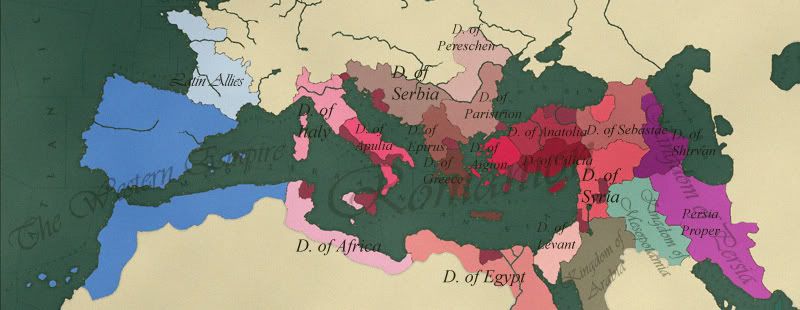
Italy, the home of Bardas and the newest hotbed of rebellion, would be split into two—the Despotate of Italy itself would now be centered in the north. Albrecht already had an idea of who would make a good lord for this volatile place—the quiet, almost hermit-like Prince Nikolaios, brother of the late Thomas. Nikolaios wanted little power, little attention, and would cause no harm at all in his new position. In the south would be a rump Despotate of Apulia, its most powerful cities and lands stripped to imperial control. Albrecht wondered if he could leave this to Bardas’ son Michael, as a sign of magnanimity. It was weakened enough it could be a possibility, but part of Albrecht wanted to divorce the troublesome Leonids completely from power.
The Balkans, another source of trouble in recent years, would be divided into five—Pereschen in the north, to go to the quiet Pereschen Komnenids, Paristrion, covering Thrace, Dorostorum and Varna, Croatia, covering the same, Epirus, covering Dyracchion and northern Greece, and finally Greece proper. Albrecht hoped the large number of Despotates would keep the region divided, and unable to unify to support some rebel, like it had backed Andreas Kaukadenos then Bardas and Antemios.
Anatolia and the Levant were far touchier subjects. Adrianos of Edessa considered the region his personal playground. Albrecht had decided the best way to sell him on the idea would be to promote people Adrianos regarded as lackeys to the new titles—but make sure they were people malleable enough they could be turned to the Imperial will. Yet again, the region was broken up into many Despotates (six) with the hope that down the line, future Despotes here would be too fractured to effectively unify against the central state.
Finally, northern Africa would be split in twain—Egypt would remain much as it always had. Albrecht had decided in the end that while Theodoros was brilliant militarily, his brashness, boorishness and general diplomatic ineptitude would keep him from being too much of a threat with his present lands. It just seemed natural then to lump the rest of north Africa into its own Despotate, likely based out of either Carthage of Kairuoan.
Albrecht leaned back and sighed. There were still problems with the plan. Where did Arabia and Mesopotamia fit in? Were they too Despotates, or something higher? ‘Client kingdoms,’ Albrecht had decided, would be a better descriptor. Secondly, there was Persia. By Albrecht’s mind, Persia needed the same treatment as Mesopotamia. It was even further removed from Konstantinopolis than Mesopotamia, with a far different culture. There was also precedent for dividing the Empire. And when left to their own devices, the new parts could thrive—the Western Empire was a living example of that. Shorn from Konstantinopolis, it had risen to completely control Iberia, dominate the Mauretanian coast, and even forcibly break apart the Anglo-French kingdom, something the older, much larger central Empire could not have done!
Persia needed to be added to that list too. Albrecht’s quill suddenly paused. Who would rule in Persia, that was the question. At first, Thomas Dadiani had seemed the obvious choice. The man was a senior strategos, brother in law to Thomas II, and was the commanding general of the tagmata left guarding Persia while Thomas and Gabriel had swung into the Hejaz. Yet the man had his drawbacks—he was known for his fiery temper, impetuous attitude, and occasional boorishness. Above all, he was not a Komnenos—Theodoros and Adrianos would not brook a non-Komnenoi being handed a royal title, let alone one with almost imperial power.
And then there was the entire problem of Gabriel. Why would the co-Emperor of the Romans ever sign off on shearing Persia away to form even a client kingdom? Albrecht sighed, trying to think of how he would broach the very idea. Gabriel would immediately explode, that Albrecht knew. Albrecht knew his late friend Thomas would have done the same. The very idea of peaceably dividing the Empire seemed an anathema to the Komnenoi! But it needed to be done. No Emperor could be in multiple places at once, and even a good Emperor would soon be spending his time travelling from Italy to Persia to Egypt trying to contain all the troubling hotspots…
He would couch the idea as part of the Despotes reorganization—something that made logical sense even to someone who might distrust Albrecht. Persia would be made into its own Despotate, and nothing ever said that the Imperial person could not hold a Despotate position. Gabriel would become Despotes of Persia, due to… Albrecht paused. Due to…aha! Due to his innate ability to relate to the Muslims and other non-Greeks within the Empire. It would seem a compliment to Gabriel’s abilities—Persia’s wealth was obvious, as was its strategic position. And once Gabriel was in Persia, dealing with the problems first hand, he would likely remain busy…
Surrepticiously, a series of soft raps came from the door to Albrecht’s study. Albrecht smiled slightly. It would be Thomas Dadiani, commander of the armies in Persia. Albrecht already knew what he was going to ask—why there was so much grain flowing into his granaries.
The Mongols would come, that was why. Other than perhaps Drogo Capet, only one people had shown the ability to match the Komnenid Empire’s intelligence abilities—Genghis Khan and his kin. Only a fool would assume the Mongol Khans did not know of the Roman civil war, and only a greater fool would assume that once they knew they would not try to take advantage of it. Albrecht knew that, at last report, Hulagu was over the Hindu Kush, but the Mongol lords had always shown an alarming ability to move with lightning speed to capitalize on an opportunity.
Yes, Gabriel needed to go to Persia. He was the only Roman who had successfully and undeniably beaten a major Mongol army in the field. He was an Emperor and had the clout to organize the tagmata there into a cohesive army. He had military settlers for garrison duties so he could have a field army. Most importantly, he’d have stockpiles of grain and food supplies, making his cities fortresses against the Mongol tide. A massive, and likely unending, Mongol tide. A tide that would keep him busy for years…
Some men went through their lives without finding their purpose. Albrecht rested easy, his conscience quieted through work…he was foisting Gabriel’s purpose onto him. It was just convenient that Gabriel’s purpose would keep him out of Konstantinopolis…
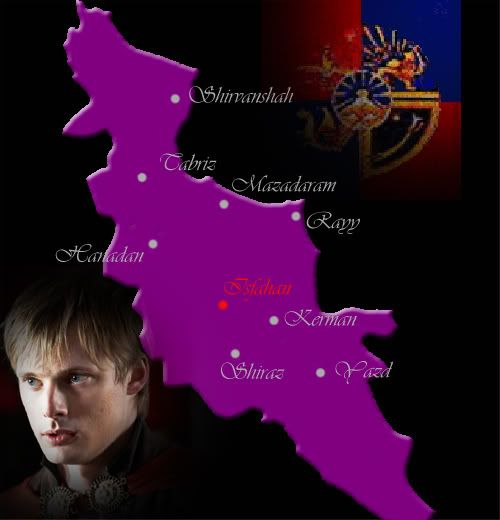
==========*==========
Antalya
To say the Despotes had been in a hurry would’ve been an understatement. More than one soldier or officer had been stunned when the commander of their entire army had suddenly appeared and rudely shoved them aside as he purposefully strode to some destination. Bardas couldn’t imagine how they would’ve laughed if they’d known where he was headed in such a hurry.
The latrines, like all such arrangements, were at the far edge of the army camp, for both sanitary and smell reasons. Like any military man, Bardas gamely climbed up to the edge of the pit, dimly lit as it was by the thin light of distant campfires, balanced himself, and finally let his stomach have the relief it demanded. He was far too busy to notice or care as his four bodyguards fanned out into their usual pattern to cover all directions of approach—and to escape the smell of the pits.
He did notice a noise that sounded like the sound of wood creaking, and his guards saying something. They didn’t shout, though, so he went back to finishing his business. He heard the wooden creaks three more times in quick succession—the tiny part of his mind not focused on his nethers assumed it was someone felling wood for a campfire. It wouldn’t be out of the ordinary, even if he had ordered the soldiers to try to refrain from cutting down too much of the local timber…
“Hello, Bardas.”
The Despotes wobbled, trying to look around. It was hard—his trousers were still around his legs, and he was uncomfortably positioned on the lip of a potentially very foul, very smelly fall.
“Who goes there!” the Despotes barked. If it was some common soldier having a lark at his predicament…
“No one,” came the sarcastic response. There! Bardas spotted a movement in the trees between the pits and the edge of the camp. Quickly he could make out a figure that stepped closer and closer, until finally the deep darkness parted revealing a familiar, deadly face. For a moment, the man looked at the half-naked Despotes, before a thin, deadly smirk came to his lips. “Pantless? A pity I’ve seen better things between the legs of chickens.”
“Eleutherios?” was all that Bardas managed to muster.
Skleros merely smirked, lowering an ugly contraption that looked like a crossbow with a wooden hump on its top and an ungainly lever on its end. The Despotes instinctively shuffled back.. only his foot slipping reminded him he couldn’t go back. Where were his guards? How had Skleros gotten into the camp?!
“Ah, this?” Eleutherios caught Bardas’ eyes moving towards the ugly weapon in his hands. “It’s a lovely thing, isn’t it?” the assassin added as he almost sweetly admired the ungainly thing in his hand. “The Mongols borrowed it from the people of Cathay. They call it a Zhuge Nu. Do you know what that means?”
Bardas crouched, trembling as the cold March air wrapped itself around his pantless body.
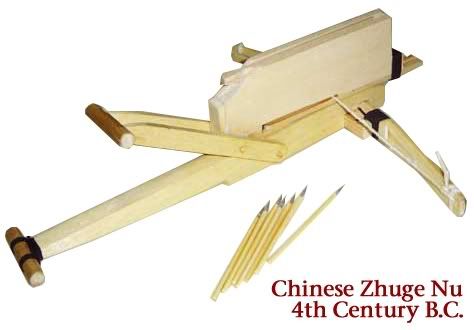
“No? Zhuge’s crossbow. There a fun bit of history for you,” Eleutherios smirked darkly. “It fires five crossbow bolts before it needs to be reloaded,” he ran a hand along the upper wooden mechanism, before turning to Bardas. The assassin’s smile became positively hideous. “Fortunate that you had only four guards with you, and they thought one man armed with a crossbow was helpless after he took down the first of them.”
“If this is about the money I owe…” Bardas finally whimpered. He prayed Eleutherios went to the trouble of sneaking into the camp and killing four guards for 10,000 solidii. The alternative…
“Oh, no no no…” Eleutherios shook his head and tsked, moving a few steps closer. “We’re way past that, Your Highness.”
“I’ll give you anything you want!” Bardas shook with terror. He’d seen what Eleutherios could do. He knew what the man could do!
“No, you can’t,” the assassin stopped ten feet away from the Despotes close enough Bardas could see every feature of his face as he smirked, but just out of the Despotes’ reach. “Ah, what an end,” Eleutherios went on, looking Bardas up and down. “The great Bardas Komnenos, Despotes, Lord of Italy, dead… fallen into a shit-pit, his pants around his legs.”
“You’re…g…g…”
“I’m a man of my word, Bardas,” the assassin showed his teeth again. They looked like fangs. “I get paid to kill someone, and I kill them. You wouldn’t want to make me into a liar, Bardas?”
“I…”
“I knew you wouldn’t,” Skleros smiled harshly. “Lord von Franken didn’t think so either.”
“Albrecht…”
“Worked for him too the whole time. Bet you didn’t know that,” Skleros winked. “I have to give credit to him,” Eleutherios said, “he is quite the humanitarian. Why let tens of thousands die on the battlefield when one man dying in his own filth will solve the problem?” Slowly, Skleros started to raise the ugly machine towards Bardas’ head. “Quite a humanitarian.”
Bardas’ eyes went wide. He tried to back up, his footing slipping, his body starting to tumble back into the manure pit. The last thing he heard was the wooden creak of the crossbow’s firing mechanism, before a foot long bolt slammed through his eye and out the back of his head.
==========*==========
Whew! A lot of stuff happened this time! Albrecht has a plan to try to stabilize the Empire, and get Gabriel out of the city—and a little of the internal turmoil in him over what happened to Thomas seeps through. Bardas is assassinated, while Antemios has left Konstantinopolis out of fear of the mob. Sefy meanwhile has offered to intervene to both sides, an offer both have accepted. Is the civil war over with Bardas’ death, or is this merely the start of something bloodier? More to come, when Rome AARisen continues!
Last edited:
Heh. I wonder when Imperial assassins will get guns alike to the one Ezio has in Assassin's Creed 2. If you haven't played, it's a very small gun attached to the wrist. And it's hidden away in leather gloves.
And Albrecht has to go!
And Albrecht has to go!
Incredible, as usual. Epic, grand. And so much text, and I hardly noticed it being there, being dragged into the story from the get go! Albrecht's plan are what the Empire needs, but without a strong man reining the princes in, it will be the Empire's downfall ultimately...
Was that last scene an homage to the death of a certain other lord on the privy from an unfortunate crossbow bolt to the body?
Albrecht's development into an evil chancellor (albeit one who has Romanion's best interests at heart, and who I'm still rooting for) seems pretty much complete. I'm not sure about his Despotes plan, though. Devolving even more power to local authorities probably won't help to stabilize Romanion in the long run, even if he's right that the empire is now too large to be successfully administered from one central Emperor and bureaucracy based in Constantinople.
Albrecht's development into an evil chancellor (albeit one who has Romanion's best interests at heart, and who I'm still rooting for) seems pretty much complete. I'm not sure about his Despotes plan, though. Devolving even more power to local authorities probably won't help to stabilize Romanion in the long run, even if he's right that the empire is now too large to be successfully administered from one central Emperor and bureaucracy based in Constantinople.
No, no, no. GO Albrecht!
Seconded. Nice move Albrecht. He is becoming even more devious as the story carries on.

